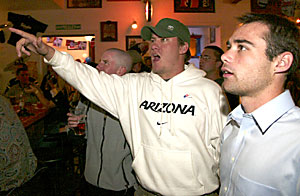 |
|
KEVIN B. KLAUS/Arizona Daily Wildcat
|
Accounting junior Matthew Carr points out to computer science senior Nathan Bell the election results for one of the states on a TV at Belushe's, 1118 E. Sixth St., last night. Nearly 150 students gathered to watch the results at Belushe's last night sponsored by ASUA and the Hillel Foundation.
|
|
|
By Jennifer Amsler and Natasha Bhuyan
Arizona Daily Wildcat
Wednesday, November 3, 2004
Print this
Tight race leads to high voter turnout, a campus divided
As the election results rolled in last night, students reflected on voting for the first time, the political atmosphere on campus, and the election's impact on the future.
Students gathered at Belushe's, 1118 E. Sixth St., last night at an election results party, co-sponsored by the Associated Students of the University of Arizona and Hillel Foundation.
More than 150 students attended the non-partisan event intended to provide students with a place to watch the news coverage and share views from the results.
First-time voters said they felt involved in the political process this year and were excited to cast their ballots because they knew it was going to be a tight race.
Simon Ogus, a consumer science junior, said considering the pressing issues in America today, it is important that candidates have a practical plan to solve them.
"It sounds cliché, but every vote does count," Ogus said.
Erin Searle, a Judaic studies sophomore who was born in Canada, said she became an American citizen two months ago and jumped at the chance to vote.
"I was looking forward to it – it was a great opportunity, a happy moment," Searle said.
Sarah Constantine, a pre-business freshman, said as a first-time voter, she was excited to vote.
"This election was so close, every vote counts," Constantine said. "It felt good – you finally get to have a say in this country."
With a national push to court young voters, some students said the election coverage was informative, while others believe it was excessive.
Shara Grifenhagen, program director of the Hillel Foundation, said because of civic engagement efforts, she noticed students this year were more educated on the issues, with a constant "buzz" surrounding the elections.
Eric Werner, a political science junior, said the campaign season had positive and negative aspects, such as misleading information and propaganda.
"A positive was the spirit of the democratic process and student engagement," Werner said.
But with all the hoopla on campus about the importance of casting ballots, some student voters felt voting was not worthy of all the commotion.
Chris Haddad, a pharmacy junior, said he voted in person in the 2000 election, but this year he voted by absentee ballot.
"With the absentee ballot, I felt very, very distant from the voting process," Haddad said.
Haddad said the most annoying thing about this election was the bickering between the two candidates.
"Bush should have not said so many bad things about Kerry and instead should have been worried about fixing the economy and reuniting our allies," he said.
Megan Neenan, an education senior, said the election was not just about who will be the next president, but also local issues such as the propositions, which she said don't receive as much attention.
"I'm more concerned with issues and there are so many details they don't talk about," Neenan said
Students at the party credited the high voter turnout in Pima County to civic engagement efforts on campus and across the nation, such as the Rock the Vote concert, speeches from major political figures, and easy access to voter registration and voting.
Alyssa Novick, a pre-education freshman, said because of the focus on voting this year, she realized how important political involvement is.
"It affects the future," Novick said. "I've never thought of it that way until this year."
Justin Haynes, a sociology junior, said the spurt of political activism among young people has gotten them to vote but they need to stay active in local politics, too.
"It might encourage it, but it is too early to tell," Haynes said.
Students were also unsure of post-election America, arguing about whether the nation would mobilize behind the new president or remain polarized.
Chris Stover, a computer engineering junior, said he believed America would support the winner.
"We can't be completely divided," Stover said. "It's good for the public to be behind the president."
Ben Weiss, a political science senior and former ASUA Senator, said many Americans will remain divided because politicians use divisive issues to split America.
"A social revolution would be positive in order to break up this two-party monopoly and power," Weiss said.
But Jennifer Hall, an education senior, said she believes unity is vital to the future of America.
"A nation divided won't stand," Hall said.
